- Home
- Linwood Barclay
Bad Move Page 4
Bad Move Read online
Page 4
“Is there a high school nearby?” Sarah asked.
“Well,” the saleswoman said, hesitantly, “not yet. But I'm sure once the neighborhood grows, and demand for educational facilities becomes great, the school board will have no choice but to build one. But there is a bus that goes by and gets them where they have to go.”
We brought the kids out the next week to show them around.
“Kill me now,” Paul said.
“What's the name of this development again?” Angie asked. “Loserville Acres?”
Now that I had Sarah onboard (“No more traipsing up and down stairs with laundry baskets,” she said on the drive home from our first tour, sliding her hand up the inside of my thigh), we worked on the kids as a team. Bigger bedrooms, huge basement rec room, extra space in the driveway for when the kids got their own cars—
“We're going to get cars?”
Overselling can get you into trouble. There was some slight backtracking. “If you get jobs, and make enough money, and want to buy yourselves cars, there will be a place to park them.”
Now that it was clear that a new house would not come with a pair of Mazda Miatas for them, the kids remained opposed, especially Angie, who had a tight circle of friends. But I knew, in my heart, that getting out of the city was the best thing for them, and for us. I didn't want my son's locker to be next to a home invader's. I didn't want my daughter hopscotching her way around used condoms and syringes on her way home. I wanted Sarah to be able to head out the door to work in the morning without running into some punk who'd run off with her purse.
We met with a Mr. Don Greenway, who closed the deals. If you'd been taken into his office blindfolded, you'd have thought it was in some elegant downtown complex. Plush carpeting, track lighting, a massive map along one wall showing the various phases of the housing development. You'd never have known you were in a complex of mobile homes bolted together as a temporary sales office.
“You're making an excellent life decision,” said Greenway. I wondered whether it was his real name. It sounded like one of the streets in Phase Two. And then I remembered, it was the name of the street where we'd looked at an available lot.
I pointed to the map. The areas where construction was under way were shaded green. But several networks of streets, which surrounded a small creek that meandered through the area, remained in white.
“Are you not going to build there?” I asked.
“Eventually,” said Greenway. “Those are subject to zoning approval by the town council. Some of the council members seem concerned by its proximity to an environmentally sensitive area, that some little salamander is at risk, but they don't understand that Valley Forest Estates will complement the natural attributes of this area, not detract from them. Now, will you be wanting a bidet? We find many customers, particularly those who've come from Europe, like to have at least one.” I was unfamiliar with the sensation of having my ass hosed down from below, and said we would be fine with conventional American fixtures.
We put our house on Crandall up on the market, and sold it in two days. There was a brief bidding war. There were, evidently, people who wanted into our neighborhood as much as we wanted out. We got $20,000 more than our asking price, moved to the new house once the builders had completed it, with no mortgage, and a bit of money left over in the bank. In the basement, we created a walk-in-closet-sized darkroom for Angie, and then finished off the rest of it so the kids would have someplace to hang out with their friends.
“If we make any,” said Angie, struggling to show her gratitude about the darkroom. “I bet everyone who lives out here is a loser.”
I should have felt liberated once we settled in, free of my downtown paranoia. But I still took precautions, still locked the car when I parked at the nearby plaza on a milk run, still insisted on driving Angie to her friends' houses once it was dark. Sarah, on the other hand, thought she could let her guard down now that we lived in the suburbs. A key left in the front door was no big deal. Hey, there's no crime out here. No one's stuffing little girls into refrigerators. “What's the point in living in this godforsaken sterile Wonder Bread and Miracle Whip world if we have to be looking over our shoulders as much as when we lived on Crandall?” she asked.
I guess with me, old habits die hard.
So here we are. It's been nearly two years now, and the reviews are mixed. There's no decent Chinese takeout nearby, no SF bookshops, no Mrs. Hayden, no walking to work, no walking to school. A pound of butter means a five-minute drive to the closest convenience store. We live in a house that is indistinguishable from any other on the street, prompting Paul to rename the subdivision Clone Valley. It was this struggle to distinguish our home from the others that spawned his sudden interest in gardening. The massive garage jutting toward the sidewalk like a whale's mouth trying to swallow passersby is the predominant architectural feature of our home. There isn't a tree within a fifteen-block radius that could cast a shadow. And the closest video store has one hundred copies of the car crash movie The Fast and the Furious, but if you asked the kid behind the counter for that Irish flick where the townsfolk conspire to trick the lottery officials that the local winner is still alive, he'd say, “Is that the one by Tarantino?”
I wouldn't deny that there were tradeoffs, that we had given up eclectic for sterile for the sake of a ground-floor laundry room. But I had something now that I couldn't count on when we lived on Crandall.
I had peace of mind. We had minimized our risks.
4
i didn't sleep well that night, after the incident with the car keys and hiding Sarah's car down around the corner. This might have had something to do with the fact that I slept on the couch in the family room, which is leather, which meant the covers kept slipping off, and every hour or so I would wake up, freezing from neck to toenail.
I shifted into a sitting position around 4:30 A.M., turned on a light, and thought about going for a walk. Almost every day, I'd take one through Valley Forest Estates, passing houses in various stages of completion. Many were done and landscaped, like ours; others looked nearly finished but lacked lawns and exterior details like light fixtures. Sheets of drywall lay stacked out in front of several others. There were the skeletal homes, nothing but wood frames that allowed you to see through the entire structure, and finally, at the furthest reaches of the development, there were huge holes in the ground, some with concrete basement floors poured. Beyond that, fields, and a pathway that led down to the banks of Willow Creek, home, evidently, of the soon-to-be-extinct Mississauga salamander.
It was, I decided, too dark for a walk. And besides, it was better to save it for when I most needed it: that time of the day when I'd be staring at the computer screen, unable to write another line of dialogue or describe the workings of an alien monster's digestive system. Walks were the best way to work out plot points.
These walks, to some degree, had gotten me interested in the community, at least to the point of reading what was going on in it. There's a tendency among us suburbanites, especially those of us who have moved from downtown but still have strong ties there, like Sarah with her job, to not give a rat's ass about what's going on in our own backyard. The suburbs are just the place where you live, but the city is where everything happens. So you read about what the downtown mayor is up to, even though he's no longer your mayor, or the police chief, even though he's no longer your police chief, because city politics and city crime are always going to be more interesting than suburban politics and suburban crime. First of all, there's more of it. And it tends to be a lot sexier. No matter where you live, you probably know the name of the mayor of New York City. But who's the mayor of White Plains? Who presides over the council of Darien, Connecticut? And who cares?
Three times a week, a local paper—called, appropriately, The Suburban—would land at our doorstep, free of charge. It was nearly as heavy as the sport utility vehicle that shared its name, thick like a weekend paper. But there was no magazine, no
book section, no Week in Review. The Suburban rarely got above twenty pages, but it was stuffed with enough flyers to wrap an entire English village's fish-and-chips orders for a month. The news stories most likely to get in were also those most likely to attract ads, so the opening of a new restaurant or hardware store always rated a few inches of copy. The Suburban's editorials were of the “on the one hand this, on the other hand that” variety, and went to great pains to offend no one.
The only thing consistently worth reading was the letters page. There'd be someone ranting about high taxes, maybe a letter from a local politician defending himself against a taxpayer rant in the last issue, someone else complaining that the whole world was going to hell and someone ought to do something about it.
So, having decided against an early morning walk in the dark, I grabbed some unread Suburbans that had been stashed on the lower shelf of the coffee table, and leafed through them. I spotted a familiar name on the letters page. There was a submission from one Samuel Spender, who identified himself as president of the Willow Creek Preservation Society.
When will this council, and in particular the members of the Land Use Committee, recognize the importance of the Willow Creek Marshlands, and prevent the destabilization of this environmentally sensitive ecosystem? Development has already been allowed to encroach too closely upon this area, but there is still a chance for the council to do the right thing and stop the approval of the final phase of the Valley Forest Estates development. This phase, if allowed to proceed, will put another hundred homes within a pop can's throw of the marshlands, threatening the homes, and the very survival, of a wide variety of species, both land-based and aquatic.
Standing at the banks of Willow Creek, surrounded by some of the only trees within a five-mile radius, I had worked out several characters' motivations over the last few months. (Does the alien slime monster eat the Earthling's brain out of hunger, or did a troubled upbringing make him do it?) When you stood next to Willow Creek, held your breath, and listened to the sounds of the shallow waters flowing by, you could almost imagine that you weren't a few hundred yards from a soulless subdivision. I could remember, when we went in to sign the deal to buy our house, seeing this area on an oversized map on the wall behind Greenway. I had to agree with Spender's letter, that it would be a shame to see the land near the creek developed, but felt like a hypocrite at the same time. What had this entire area looked like before the developers took over? What had the land where our house now stood been before the surveyors marked out where the streets would go, and the bulldozers came in and leveled everything? Had it been woodlands? Had it been farmland? Did corn used to come out of the ground where we now parked the cars? How many birds and groundhogs and squirrels had to relocate once the builders broke ground on Valley Forest Estates?
But at least our house didn't back up onto a marshland. It's not like we were tossing our trash into the creek. I've never been what you'd call a rabble-rouser, a guy who stands up at meetings and demands change. I'm not the type of taxpayer who gets on the phone to his representative and demands a stop sign at the corner. I've always been content to let others be activists, and maybe that comes from a background of reporting. You felt you were doing enough just by keeping a record of what the champions for change were up to. I gave you a voice, I got your story into the paper, but don't ask me to get involved personally. I've got articles to write.
I didn't know that the developers of Valley Forest Estates were a bunch of environmental rapists, but I did know that they were unable to properly caulk a window or keep a leaking shower from staining the kitchen ceiling below. Maybe they should be stopped from building more homes anywhere, not just on the banks of Willow Creek.
When I was finished reading the Suburbans and some sections of the Metropolitans from the previous weekend, the sun was up. I heard Sarah go into the kitchen, and she said nothing when I wandered in.
The remainder of the day before had not gone well. I expected to make amends with Sarah shortly after I returned with her car. But she took the car out again as soon as I was back with it. She went, it turned out, to the drugstore, and bought a tube of ointment for my burned hand. She pulled into the driveway half an hour after she'd left and found me sitting at the kitchen table, where I had been wondering whether Sarah had left me for good and what that meant in terms of how many burgers I should throw onto the barbecue. She pulled the tube out of her purse and threw it at me, nailing me right in the eye.
She didn't speak to me for the rest of the evening. We started out in the same bed, but there was a gulf between us under the covers. I reached over tentatively once, to touch her back lightly, a lame gesture at trying to open communications, but Sarah shifted away, and matted the covers down around her as a defense against any more entreaties. So I slipped out from under the covers, tucked a pillow under my arm and grabbed a blanket from the closet, and went downstairs.
Paul and Angie, taking their mother's side, had given me the cold shoulder the rest of the day. Paul had filled Angie in, when she got home, on my car-hiding stunt. I tried to explain to them, while their mother was upstairs, that it hadn't been my intention to be mean. What I'd done was for their mother's own good. Sure, she was angry with me now, but did anyone think she'd ever leave her key in the lock again? Huh? Did they?
They walked out of the room on me. And the next morning, at breakfast, they said nothing as they poured themselves juice and spooned down some strawberry yogurt. Actually, Paul used a spoon only to finish off the residue of yogurt he was unable to consume by tipping the small plastic container up to his mouth and hurtling it down like an extremely thick milkshake. And then they left together, walking a half block to the corner to meet the high school bus.
I offered to make Sarah some tea and toast, but she indicated she was fine, she'd take care of it, although what she actually said was “Move.”
I went to reach for the kettle to fill it from the tap, but she nudged me out of the way and grabbed it herself.
“I'm really sorry,” I said.
Sarah said nothing.
“And thanks for the stuff, that ointment. I was surprised you still went out and got it for me. I wouldn't have blamed you if you hadn't. I put it on my hand and it was right back to normal this morning. It stung a bit in the night, you know, but then it went away, so, thanks.”
Sarah got out a teabag and a slice of bread for the toaster. When couples aren't speaking to each other, all the other sounds in a room become heightened. The ticking of the electric kettle warming up, the scraping of the butter knife across hot toast, the clinking of a spoon against the inside of a china cup. As much to break the silence as to find out what was going on in the world, Sarah turned on the small under-the-cupboard TV. In addition to reading a couple of papers every morning, she watches a lot of CNN and local news so that she has a good handle on what's happening before she gets to the paper.
“—the third house in the region police have raided this year,” said the morning man with the very nice hair. “Police are alarmed by the growing number of people who have turned their homes into massive marijuana-growing operations. Not only is it against the law, but it's a major fire hazard, considering that these illicit growers bypass the electric meters, sometimes inexpertly, and all that extra power can overheat circuits with disastrous results.
“A woman in Bentley says the thief who stole her purse from her shopping cart also made off with a winning lottery ticket for $100,000. Lottery officials say they are paying special attention to people coming in to claim prizes.
“Finally, more about a story that still haunts this city, nearly two years later. Police say they may have some leads in their hunt for Devlin Smythe, wanted in the death of little Jesse Shuttleworth, who—”
Sarah scrambled for the remote on the kitchen table and turned up the volume.
“—was found dead in a refrigerator in Smythe's apartment. Police believe Smythe also went by several other names, including Devin Smythe, Da
niel Smithers, and Danny Simpson. There have been reports of suspects matching Smythe's description in the Vancouver and Seattle areas.”
“Jesus. Two years,” Sarah said. “They always call her ‘little.' Of course she was little. She was five years old, for Christ's sake.” It was the most she'd said in my presence since the day before.
“Authorities in those areas are assisting local police in their inquiries. Coming up: Take a close look at those bills you've got in your wallet. They may just be counter—”
Sarah turned off the TV, dropped off her plate and cup in the sink, and went upstairs to brush her teeth before heading into the city. I refilled the kettle and plugged it in to make some coffee for myself. While the water heated I went into my study around the corner from that ground-floor laundry room, which was no longer the aphrodisiac it once was, booted up my computer, and opened the file folder next to the keyboard where I kept the pages of my manuscript. The word “Position” was scribbled across the otherwise blank title page, but that was just an inside joke. The real title, the one that would appear in the publisher's spring catalogue, was TechnoGod. There were 357 more pages under that title one, and only a last chapter to write and some proofreading to do before bundling it off to my editor.
I write science fiction, mostly, and you could probably figure this out by stepping into my study. Or else you'd conclude that I'm a thirteen-year-old boy trapped in the body of a forty-one-year-old man. Maybe you'd be right on both counts. The room is littered with SF kitsch. Star Wars figures, Terminator statuettes, plastic Jurassic Park dinosaurs from Toys “R” Us, a rubbery shark from Jaws, small diecast models of the various flying machines from the Thunderbirds puppet show, an assortment of Enterprises from all the Star Trek series and movies. My writing center constitutes the short end of a large L-shaped desk, while the long end is my modeling center. On this particular day there were two model kits on the go—a foot-long Seaview submarine from the 1960s television series Voyage to the Bottom of the Sea, and a resin model of Ripley, the Sigourney Weaver character from the Alien movies. I like building models of things—spaceships, submarines, futuristic cars—more than assembling models of people, but I've always been partial to anything related to the Alien flicks.

 Chase
Chase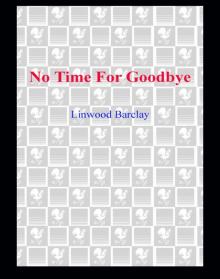 No Time for Goodbye
No Time for Goodbye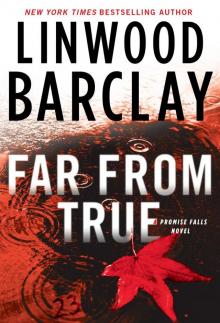 Far From True
Far From True Lone Wolf
Lone Wolf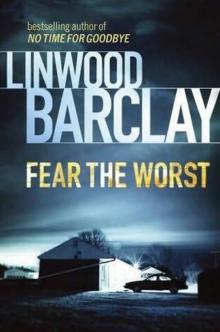 Fear the Worst
Fear the Worst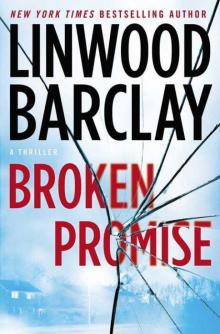 Broken Promise
Broken Promise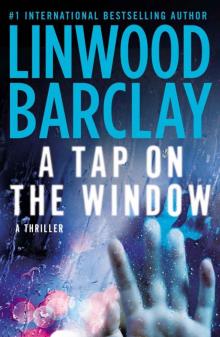 A Tap on the Window
A Tap on the Window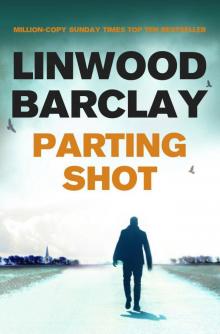 Parting Shot
Parting Shot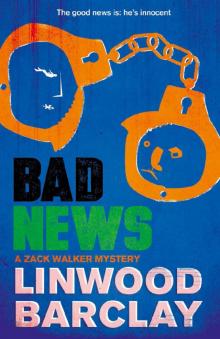 Bad News
Bad News Too Close to Home
Too Close to Home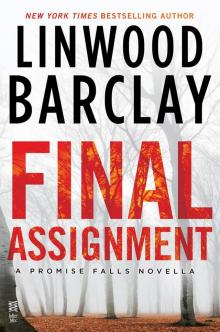 Final Assignment
Final Assignment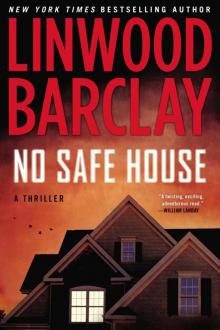 No Safe House
No Safe House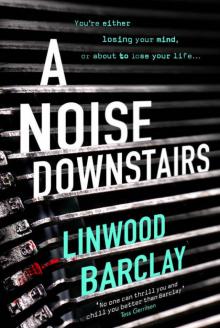 A Noise Downstairs
A Noise Downstairs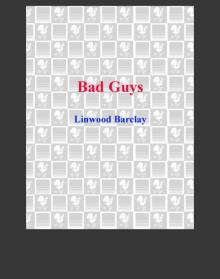 Bad Guys
Bad Guys The Accident
The Accident Stone Rain
Stone Rain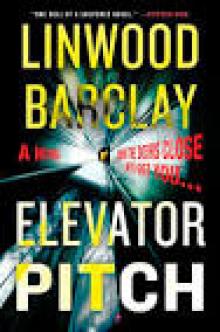 Elevator Pitch
Elevator Pitch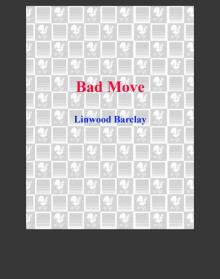 Bad Move
Bad Move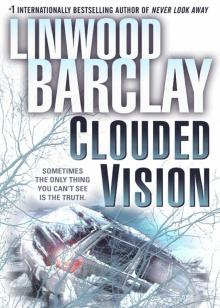 Clouded Vision
Clouded Vision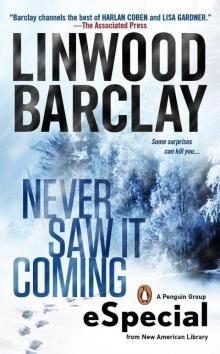 Never Saw It Coming
Never Saw It Coming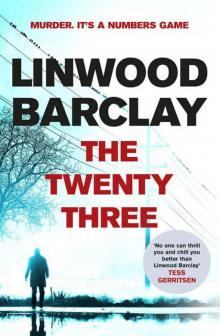 The Twenty-Three
The Twenty-Three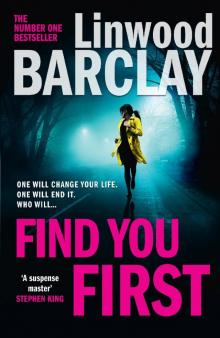 Find You First
Find You First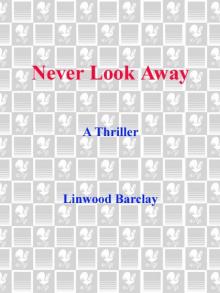 Never Look Away
Never Look Away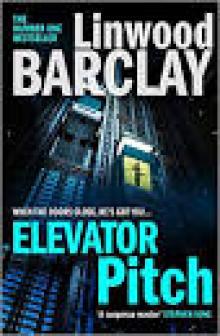 Elevator Pitch (UK)
Elevator Pitch (UK)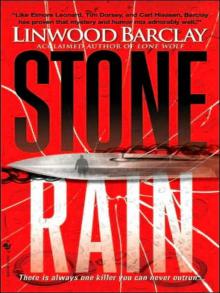 Stone Rain zw-4
Stone Rain zw-4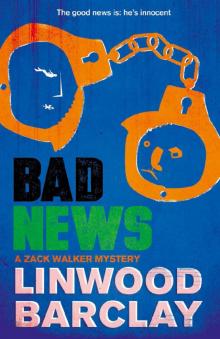 Bad News: A Zack Walker Mystery #4
Bad News: A Zack Walker Mystery #4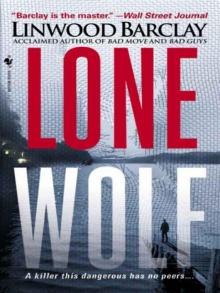 Lone Wolf zw-3
Lone Wolf zw-3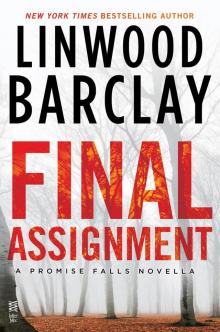 Final Assignment: A Promise Falls Novella
Final Assignment: A Promise Falls Novella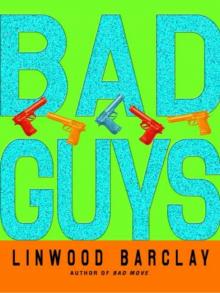 Bad Guys zw-2
Bad Guys zw-2 Never Saw It Coming: (An eSpecial from New American Library)
Never Saw It Coming: (An eSpecial from New American Library)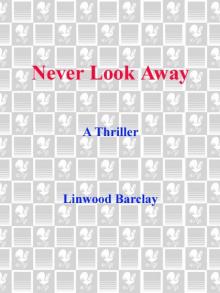 Never Look Away: A Thriller
Never Look Away: A Thriller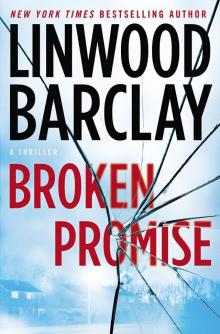 Broken Promise: A Thriller
Broken Promise: A Thriller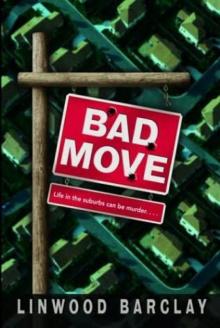 Bad Move zw-1
Bad Move zw-1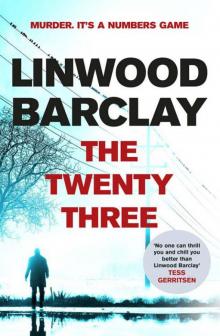 The Twenty-Three 3 (Promise Falls)
The Twenty-Three 3 (Promise Falls)